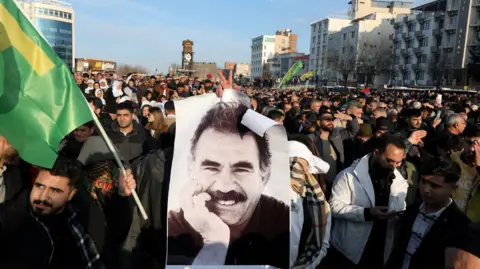In a significant shift in the ongoing conflict in Turkey, the outlawed Kurdish group known as the Kurdistan Workers’ Party (PKK) has announced its decision to lay down arms and disband after a protracted 40-year insurgency. This development represents a monumental step in the turbulent history of Turkey’s relationship with its Kurdish population, which constitutes about 20% of the nation’s demographic.
The announcement came in response to a call for disbandment from the PKK’s imprisoned leader, Abdullah Ocalan. Currently serving a life sentence in solitary confinement on an island prison in the Sea of Marmara since 1999, Ocalan has shifted the PKK’s aims from striving for independence to seeking greater autonomy and rights for Kurds within Turkey. This evolution in objectives reflects a broader push for democratic representation rather than outright separation, suggesting a willingness to engage politically within the existing framework of the Turkish state.
Ocalan’s recent writings emphasized the necessity of democracy and political consensus, insisting that there exists “no alternative to democracy in the pursuit and realization of a political system.” The implications of this statement are substantial, as they signal the PKK’s readiness to transition from violence to negotiation, a move likely aimed at enabling dialogue with the Turkish government.
Despite the progress indicated by this announcement, uncertainty looms regarding the future for Ocalan and the PKK’s supporters. Observers speculate that his calls for disbandment might be politically motivated, possibly aimed at securing some form of leniency or parole for his long incarceration. For Kurdish politicians, there’s hope for renewed dialogue that could pave the way for enhanced Kurdish rights and political engagement, a crucial aspect given the increasing urgency in Turkish politics.
Both the PKK and the Turkish government appear to have tangible reasons for reaching this critical juncture. The PKK’s position has been considerably weakened due to intense military operations by Turkey in recent years, complicating their operational capabilities, especially in northern Iraq and Syria, where they have significant affiliations. On the other hand, President Recep Tayyip Erdoğan faces a challenging political landscape ahead of Turkey’s forthcoming presidential elections in 2028. Gaining support from pro-Kurdish parties could be pivotal if he hopes to secure another term in office.
The AK Party, led by Erdoğan, has characterized the PKK’s disbandment as a vital move toward achieving a “terror-free Turkey.” According to a party spokesperson, the discontinuation of armed conflict will be overseen by state institutions, ensuring that the process aligns with national interests and security protocols.
International relations expert Winthrop Rodgers from the think tank Chatham House has noted that for meaningful change to occur, Turkey would need to undergo “a major democratic transition.” Although there has been some positive discourse from Turkish authorities in recent months, the path towards full Kurdish participation in both political and societal frameworks remains opaque. Rodgers suggests that while goodwill gestures from Turkish leaders may have facilitated the PKK’s decision to disband, the critical question of whether these gestures translate into substantive policy reforms for Kurds is still unaddressed.
As the situation unfolds, it is evident that the ball is largely in Turkey’s court. The actions taken in the coming weeks and months will likely determine the trajectory of Kurdish rights in Turkey and the enduring quest for political resolution. Both the PKK’s disbandment and Turkey’s response may symbolize a pivotal chapter in the complex narrative of Kurdish identity and autonomy within the nation’s borders. How these negotiations unfold could well shape the future landscape of Turkish politics, with the potential for either division or unity, freedom or oppression, encapsulating the plight of the Kurdish people.



